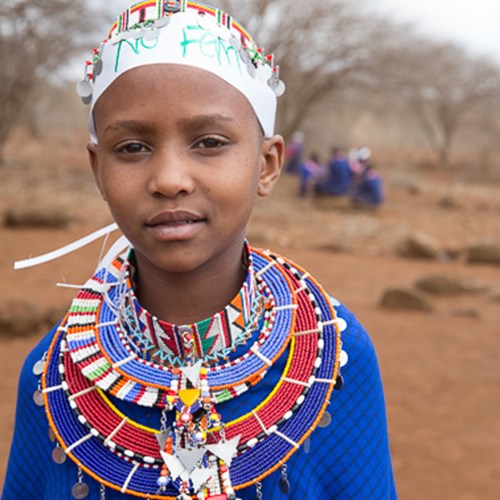
Somalilandsun- Recently nearly over 1200 Masai girls in southern Kenyan town took part in a life-changing ceremony. The Alternative Rite of Passage (ARP) celebrates a girl’s transition to womanhood without the deep-rooted and dangerous tradition of female genital mutilation (FGM). Organised by Amref Health Africa in partnership with the Maasai community in the region, the ARP takes place over three days and includes life-skills lessons, a pageant for the girls and the ceremony itself. It observes and respects the community’s traditional practices while upholding the rights of girls like 11-year-old Naserian*. Here, an hour before the ceremony, Naserian told Girl Effect what the ARP means to her, her friends and her community.
My day started with breakfast; most of the time it’s tea and some bread. After that I brushed my teeth and washed my face. Because school hasn’t started yet I helped my mom mop and clean the house.
Naserian
After lunch I practiced my mathematics and English, which is my favourite subject because my teacher told us that it’s the language that people speak all over the world. I would love to see more of the world when I’m older.

 I’m so glad that school starts in two weeks – I’m looking forward to seeing my teachers, and I love to learn. When I grow up I want to be a doctor, because that will help the community. When Maasai people who are in pain go to the hospital, they aren’t able to speak or understand English. Because of that they can’t explain what they are suffering from, and doctors aren’t able to help them, so they suffer a lot of unnecessary pain.
I’m so glad that school starts in two weeks – I’m looking forward to seeing my teachers, and I love to learn. When I grow up I want to be a doctor, because that will help the community. When Maasai people who are in pain go to the hospital, they aren’t able to speak or understand English. Because of that they can’t explain what they are suffering from, and doctors aren’t able to help them, so they suffer a lot of unnecessary pain.
In Maasai culture, a girl’s role is to help the community. After she becomes a woman, she gives birth to children and her role is to help the family.
But things are changing. My mother wasn’t educated, and I am. She said that when she was a young girl she wasn’t aware that FGM is a bad thing. But now she supports me, and she’s happy that I’m not getting cut.
After you get cut you can be married off far too young. And, you know, I’m a child and I don’t even know how to cook.
In the traditional ceremony, girls who got circumcised were in lot of pain.
During the ARP girls attend two days of life-skills lessons before the ceremony. We learn about our rights as a girl and who we can turn to if we’re in danger. People who attend the ceremony are allowed to talk to each other, and so woman are allowed to ask men questions.
Most importantly, girls don’t get circumcised anymore. Not getting cut is my right.
I’m looking forward to the ceremony. It won’t hurt, and I want to show everyone what we’ve learned – that circumcision is a bad thing. It can lead to excessive bleeding or even death. And after you get cut you can be married off far too young. And, you know, I’m a child and I don’t even know how to cook.
I think a good age for a girl to get married is 21. I think I’ll wait until I’m 24.
My future looks good. I’ll be educated and have a lot of knowledge. Because of that I can take care of my children when I’m older. I also want an educated husband because that will gives us the opportunity to support our family, and we won’t be poor.
I don’t want any girl to be hurt by FGM any more, because all girls should have equal rights.
In Kenya, FGM is illegal, however the practice is commonplace among traditional communities. According to the latest data, 27 per cent of girls and women between the ages of 15 and 49 in the country have been cut. Since Amref Health Africa started partnering with local communities in Kenya to hold ARPs, 9,000 girls have taken part and avoided undergoing FGM.
* name has been changed per Girl Effect’s child protection policy.
All photos: Anja Ligtenberg | Amref Flying Doctors






















